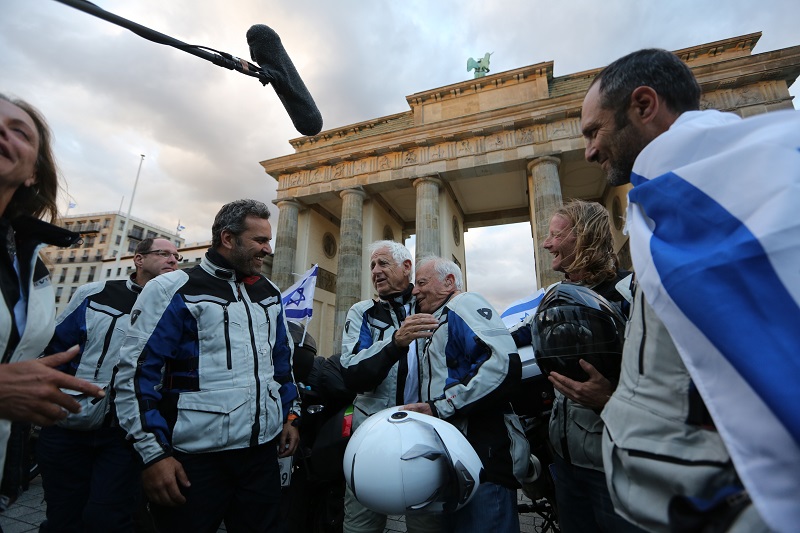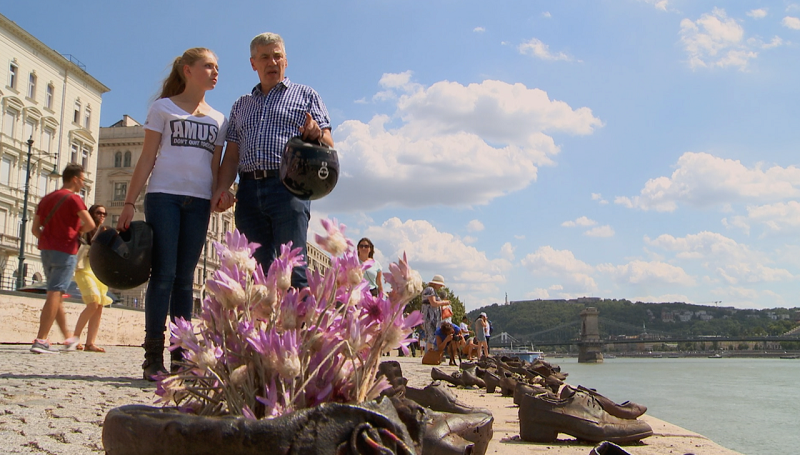Back To Berlin: A road trip through history
Director Catherine Lurie traces 11 Jewish bikers through nine countries as they retrace an historic trip for the 2015 European Maccabi Games
Broadcaster and film-maker Catherine Lurie knows a good story when she sees one.
Six years ago, as someone with a long association with the World Maccabi movement, she was asked to be a broadcaster for the 2013 Maccabiah Games in Israel.
Delving into Maccabi’s archives, Lurie found an extraordinary story: in the 1930s, three groups of motorbikers had set off from Tel Aviv in an effort to recruit Jewish athletes from around the world to take part in the newly-created Maccabiah Games.
Get The Jewish News Daily Edition by email and never miss our top stories Free Sign Up
So when she heard that Berlin was to host the 2015 European Maccabi Games, at the notorious Waldbühne stadium, the site of Hitler’s 1936 Olympics, Lurie knew she had an amazing opportunity.
The result is a fascinating documentary, Back to Berlin, which opens in cinemas across the UK this week.
Replicating the historic journeys of the original 1930s bikers, the film follows 11 Jewish bikers through nine countries.
We meet two Holocaust survivors, seven descendants of survivors, and two grandsons of the 1930s Maccabiah bikers.
Lurie advertised for Jewish bikers with a story to tell – of their parents, or grandparents.
Her plan was to take “a new breed of proud and strong Jews to fly the Israeli flag and deliver our symbolic torch to the very same Nazi stadium site, through a Europe once again beset by resurgent antisemitism”.

The men and women of the 21st century bikers’ brigade are, to begin with, a different kind of Jew. They are mainly Israeli, and some make it clear from the outset that they don’t understand the response of the European Jews, who appeared to go meekly to their deaths during the Holocaust.
But, one by one, through often painful revelations, the modern-day bikers come to understand the terrible choices faced by their parents and grandparents.
Nowhere is this more strikingly illustrated than with the experiences of one of the oldest bikers, Yoram Maron, 78 at the time of filming, and his son, Danny, a press photographer in Israel.
He was keen to accompany his father on the journey as a way of finding out more about his family history.
Anyone who, like Danny, has worked in the often tragic circumstances of the Middle East might be assumed to have a tough exterior.
But his face, as he listens to what his father witnessed, recounted to an appalled and silent group in Auschwitz, is one of the most powerful scenes in the entire film.
Kobi Samuel, an Israeli art dealer, is another of the bikers. His mother’s family came from Salonika (Thessaloniki), and there are emotional interviews with him and his grandmother, Angel Margo, talking about her Holocaust experiences.
In the old train station in Salonika, there are disused rail lines and some of the cattle trucks used to transport the Greek Jews to the death camps. Kobi takes his fellow bikers inside and describes the conditions faced by the Jews, who spent 10 days on the trains to Auschwitz.
But Gili Shem Tov, another of the bikers, cannot stand the heat. “I can’t even explain what I’m feeling”, she says. “We are always hearing about the Holocaust, but to feel the heat, and imagine the men, women and children, some of the women pregnant, on the train for 10 days and they didn’t know where they were going it’s too much.”
As the bikers zigzag through Europe, Gili has her own story to tell: they stop in Samokov, the birthplace of her Bulgarian grandfather, Viktor.
Within the ruins of the last synagogue of Samokov – where there are no longer any Jews – Gili recounts how the Bulgarian Jews were due to be deported to the death camps. Until, that is, the authorities were confronted by Bishop Metropolitan Kiril, who challenged the decision.

Astonishingly, even though Bulgaria was an ally of the Nazis, the country’s Jews were not deported, but allowed to return home.
For Dr Yaron Munz, son of two Holocaust survivors from Romania, the Holocaust is “a black hole” because neither of his parents will talk about what happened to them.
“I don’t want to feel what they felt,” he says. “But I want to understand what they felt”.
In every location, Catherine posts relentless and chilling statistics of how many Jews were murdered and deported, some by the Nazis, but often by the Nazis and their allies.
As each terrible story unfolds, it’s hard to see the redemptive possibilities in the film. But then the bikers finally arrive in Berlin, their Israeli flags proudly flying as they ride through the Brandenburg Gate.
There they make a triumphant entrance into the one-time Nazi stadium for the start of the 2015 European Maccabi Games, passing on the flaming torch they have brought with them from Israel.
Catherine believes the concluding message is a powerful one: “We are here, we are a new people today.”
Back to Berlin (12A) is in cinemas from tomorrow. Details: www.backtoberlin.co.uk
Listen to this week’s episode of the Jewish Views Podcast!

Thank you for helping to make Jewish News the leading source of news and opinion for the UK Jewish community. Today we're asking for your invaluable help to continue putting our community first in everything we do.
For as little as £5 a month you can help sustain the vital work we do in celebrating and standing up for Jewish life in Britain.
Jewish News holds our community together and keeps us connected. Like a synagogue, it’s where people turn to feel part of something bigger. It also proudly shows the rest of Britain the vibrancy and rich culture of modern Jewish life.
You can make a quick and easy one-off or monthly contribution of £5, £10, £20 or any other sum you’re comfortable with.
100% of your donation will help us continue celebrating our community, in all its dynamic diversity...
Engaging
Being a community platform means so much more than producing a newspaper and website. One of our proudest roles is media partnering with our invaluable charities to amplify the outstanding work they do to help us all.
Celebrating
There’s no shortage of oys in the world but Jewish News takes every opportunity to celebrate the joys too, through projects like Night of Heroes, 40 Under 40 and other compelling countdowns that make the community kvell with pride.
Pioneering
In the first collaboration between media outlets from different faiths, Jewish News worked with British Muslim TV and Church Times to produce a list of young activists leading the way on interfaith understanding.
Campaigning
Royal Mail issued a stamp honouring Holocaust hero Sir Nicholas Winton after a Jewish News campaign attracted more than 100,000 backers. Jewish Newsalso produces special editions of the paper highlighting pressing issues including mental health and Holocaust remembrance.
Easy access
In an age when news is readily accessible, Jewish News provides high-quality content free online and offline, removing any financial barriers to connecting people.
Voice of our community to wider society
The Jewish News team regularly appears on TV, radio and on the pages of the national press to comment on stories about the Jewish community. Easy access to the paper on the streets of London also means Jewish News provides an invaluable window into the community for the country at large.
We hope you agree all this is worth preserving.
- Kosher Culture
- Arts
- Samokov
- Bishop Metropolitan Kiril
- Nazis
- Bulgaria
- Dr Yaron Munz
- Romania
- Catherine Lurie
- Berlin
- 2015 European Maccabi Games
- Back To Berlin
- Gili Shem Tov
- Salonika
- Yoram Maron
- 2015 Maccabi European Games
- Waldbühne
- Maccabiah Games
- World Maccabi
- Holocaust
- tel aviv
- greece
- Features
- Film and TV
-
By Brigit Grant
-
By Laurent Vaughan - Senior Associate (Bishop & Sewell Solicitors)
-
By Laurent Vaughan - Senior Associate (Bishop & Sewell Solicitors)
-
By Laurent Vaughan - Senior Associate (Bishop & Sewell Solicitors)
-
By Laurent Vaughan - Senior Associate (Bishop & Sewell Solicitors)





















